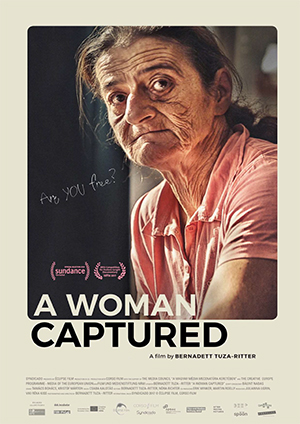Woman Captured
Synopsis
Anyone who questions why human trafficking is frequently referred to as “modern-day slavery” need only to watch Bernadett Tuza-Ritter’s stirring documentary A Woman Captured to see how accurate such language is in conjuring the abject state of those who have been exploited as labor and forcibly compelled to give up their freedom for the sake of others. The unconventional subject of this film — fifty-three-year-old Marish — has spent the past ten years of her life in Hungary serving the needs of her offscreen captor, Eta, who agreed to let the young filmmaker into her house after shamelessly demanding a 300 Euros-a-month privilege to do so. As revelations about the titular victim accrue over the three-month shooting period, Tuza-Ritter makes several bold stylistic choices, opting to focus her handheld camera on the wizened features and bandaged broken arm of Marish while leaving Eta’s face, if not her threatening voice, out of the picture. Marish’s “duties” as a domestic servant include cleaning and cooking, but she receives no payment, has had her identity papers taken away, and is only allowed to leave this virtual prison in order to buy groceries or to travel to her other job at a nearby factory (where she works night shifts). Repeatedly subjected to physical and verbal abuse by the unseen woman, who deprives her of her salary and keeps her from visiting her teenaged daughter, Marish is trapped inside a living nightmare. However, lest viewers think that all is darkness and despair, a sunnier side to Marish’s story brightens the proceedings as the film reaches its almost jubilant conclusion. Unlike many other directors of human trafficking films, Tuza-Ritter is not a bystander passively recording the abuses heaped on her subject, but instead humanely intervenes and helps Marish — big-hearted, good-humored, and surprisingly hopeful despite her dire circumstances and low self-esteem — make an important, life-changing decision once their relationship has evolved to one of complete trust. There are approximately 22,000 women like Marish in Hungary, whose lives of quiet desperation and enslavement go largely unnoticed. One wishes, after watching the inspirational A Woman Captured, that there were just as many similarly compassionate filmmakers documenting their day-to-day struggles.
Written by David Scott Diffrient

Filmmakers
Bernadett Tuza-Ritter
(2017)
Hungary
89 min
In Hungarian with English subtitles
Screenings
Sunday, April 7
The Lyric
3:30 p.m.
Film Guest
Director Bernadett Tuza-Ritter will be joining
a post-screening Q&A moderated by Julia Khrebtan-Hörhager.